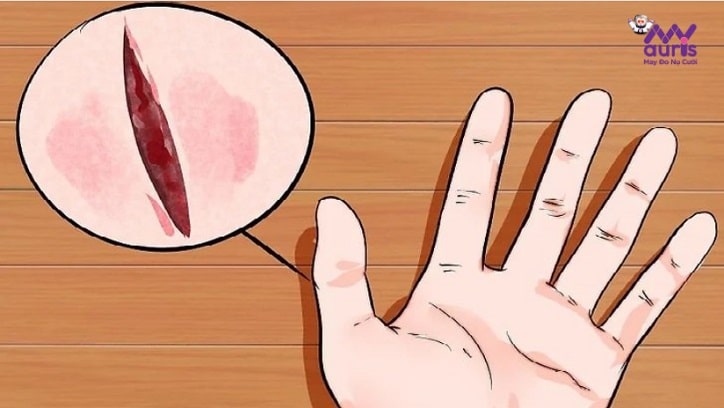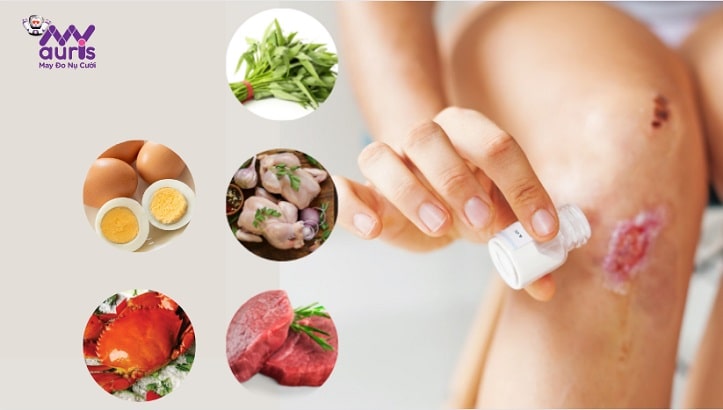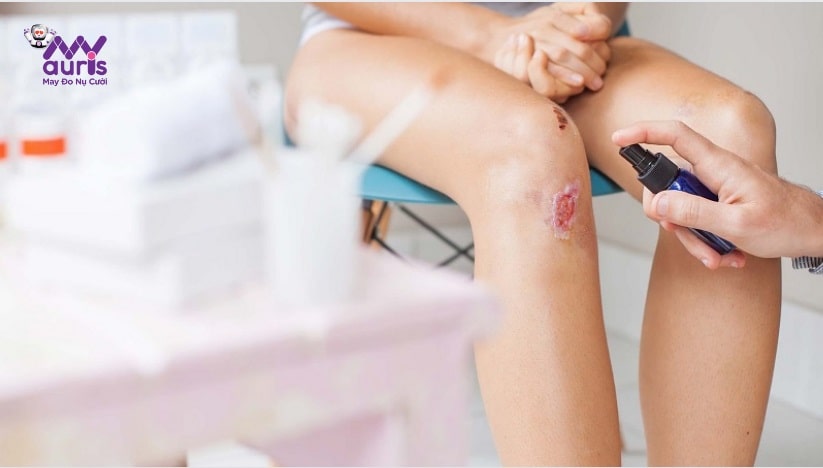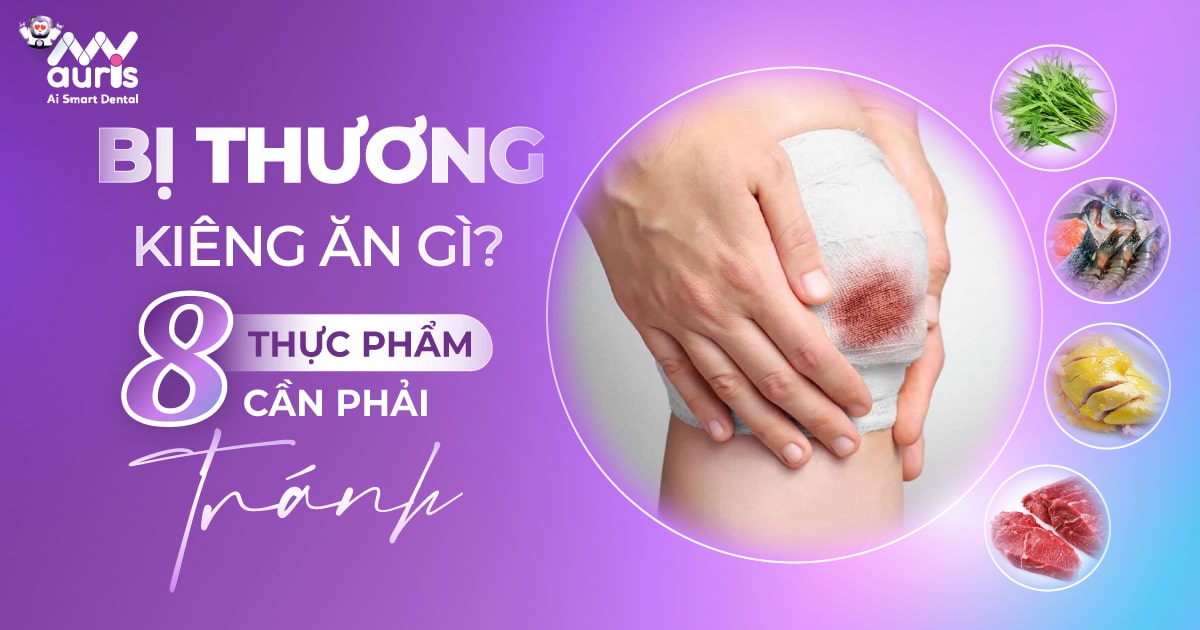What to avoid when injured is a question asked by many people who are unlucky enough to have injuries on their bodies. For wounds in general and open wounds in particular, you should eat adequate nutrients, especially protein and vitamins, to improve your health and help the wound heal quickly. However, after the wound has healed, high aesthetic requirements are required when healing scars, especially easily visible wounds such as the face, arms or legs. The article below will help you know some foods that you need to abstain from.
Identify the condition of open wounds through stages
Wounds are injuries such as torn skin, punctures, cuts, etc. with signs of bleeding, redness, and swelling around the damaged area. The patient will feel pain and discomfort on the skin surface. In case of small wounds you can take care of yourself at home, whereas in case of large and deep wounds, you need to go to the hospital for proper treatment and at the same time avoid the risk of infection.

The wound condition has 3 stages: inflammation, fibroblast and regeneration. Specifically as follows:
- Inflammatory phase: Blood vessels constrict to prevent blood loss (due to platelets gathering to form blood clots). Once the clot forms, the blood vessels expand again and allow maximum blood flow to the injured area. At this time, white blood cells move to the damaged site to destroy bacteria and other foreign substances. Furthermore, skin cells multiply and grow throughout the damaged area;
- Fibroblast stage: Inside the wound, collagen and protein fibers begin to grow. With increased collagen growth, the edges of the wound contract and close. At the injured site, small blood vessels form to supply blood to newly created skin cells.
- Regeneration phase: Is when the body needs to continuously replenish collagen and refine the injured area. This is also the reason why scars fade over time.
So what should you avoid eating when injured? 8 foods to avoid
Do not eat water spinach
Morning water has the effect of clearing heat, detoxifying, laxative, diuretic, and producing skin because of its cooling properties. Therefore, in cases where the wound is open, you should avoid these types of thingsThis food prevents flesh from protruding from open wounds.
Abstain from seafood and fishy foods
Seafood is considered one of the foods with many nutrients for the body. However, if the wound is open or the wound is being stitched, because this food will cause itching and discomfort in the wound, causing slow healing and possibly leaving scars.
Abstain from eating smoked meat or sweet candies
These foods cause the body to lose important vitamins and minerals in the body. cell regeneration, making the wound heal longer.
Do not eat chicken
Chicken will make the wound itch and take a long time to recover new skin. The best way is to avoid this food until the wound has completely healed.

Do not eat eggs
Eggs are on the list of things that need to be avoided when injured, especially in the tender skin stage. The composition of eggs has properties that promote the proliferation of collagen fiber tissue, and at the same time produce a lot of flesh, leading to excess skin causing keloid scars, which will cause loss of aesthetics.
If you have tinea versicolor or dark skin, eating eggs can cause it to spread. Therefore, you need to remove it from the menu during the time of scar healing or growing new skin.
Do not eat beef
Beef is nutritious food, very good for restoring the health of open wounds and forming dark scars. In addition, people with acne need to abstain from beef.
Do not eat dishes made from sticky rice
Many people say: “Eating sticky rice will cause the wound to swell and leave scars bad. According to experts, foods made from sticky rice that are hot will cause the wound to become more infected and swollen. Eating foods made from sticky rice regularly can easily cause keloid scars. Especially when the wound is young, you need to avoid these foods to limit bad scarring on the skin.
Avoid spicy foods. heat and stimulants
These are foods that will cause your wound to fester and take longer to heal.
At each stage of the healing processInjury, the patient needs to have a suitable nutritional regimen so that the process can take place quickly and without leaving scars. Therefore, fasting from a wound will help you heal quickly and limit scarring on your body.

How long does abstaining from these foods last?
What foods should you abstain from when injured and for how long? In fact, abstaining from certain foods when you have an open wound will cause many inconveniences in daily activities. In addition, you have to limit the foods you love and find it difficult to design a daily menu for your family and friends. Therefore, the abstinence period is also a question that many people are interested in.
Depending on each person’s constitution and level of infection, the period of abstinence from foods can last
from 5 – 7 days or even more. Furthermore, this is also the time needed to rebuild damaged tissues, which you can see with the naked eye as the wound gradually heals and a dry scab appears.
However, in order for the wound to heal quickly, you need to strictly follow your doctor’s instructions and clean and care for the wound every day. Besides, you need to build a scientific and healthy nutritional regimen, especially supplementing adequate water and vitamin C. In addition, you can refer to some topical scar treatment medications to help fade scars and heal wounds faster.
However, suddenly cutting nutrients out of your daily diet can cause your body to suffer. some health problems. The best way is to see a specialist to check the wound and ask the doctor’s advice on what foods to avoid when injured.
Above are the foods to avoid when have a wound that you can refer to. Besides, you can build a suitable diet and have regular health check-ups at least every 6 months.
Kim Dung





